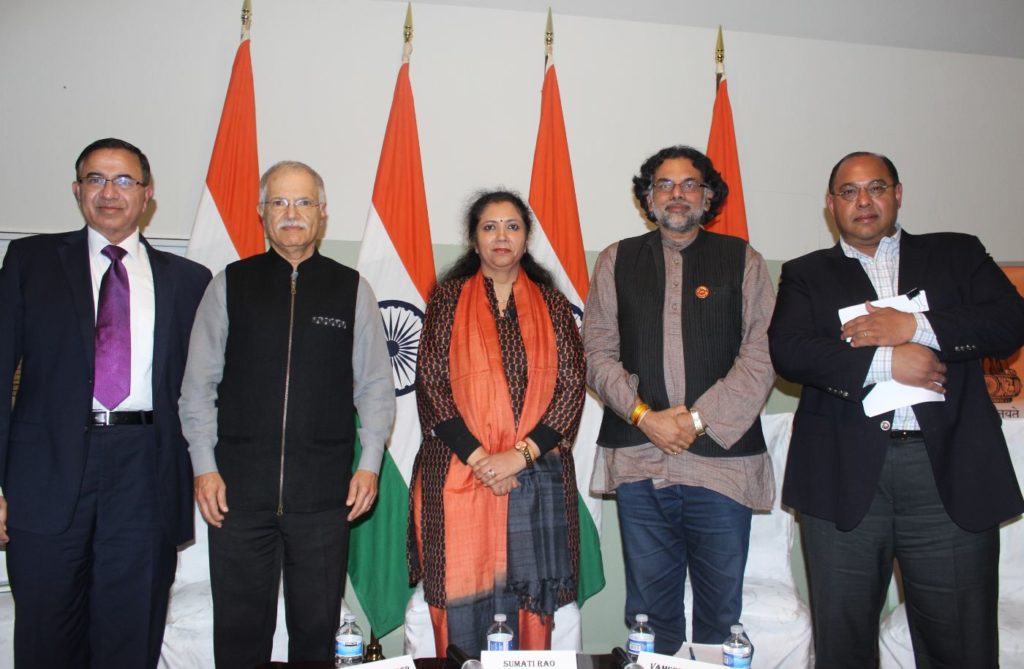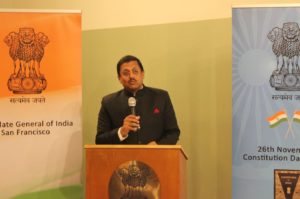
Sumati S Rao, Vamsee Juluri and Arshad Paku Khan
VIDYA SETHURAMAN
India Post News Service
SAN FRANCISCO: To commemorate the Constitution day of India, Consulate of India, San Francisco, arranged a panel discussion on “Indian Constitution @ 70: Managing Diversity, Democracy and Development” on November 26 at the Gadar Memorial Hall, San Francisco.
Constitution Day (National Law Day), also known as Samvidhan Divas, is celebrated in India on
November 26 every year to commemorate the adoption of the Constitution of India. On November 26, 1949, the Constituent Assembly of India adopted the Constitution of India, and it came into effect on 26 January 1950.
The Indian government declared November 26 as Constitution Day in 2015 on the 125th birth anniversary of Dr B.R. Ambedkar, who had chaired the drafting committee of the Constituent Assembly and played a pivotal role in the drafting of the constitution.
The Indian Consulate in San Francisco marked the 70th anniversary of the adoption of the Indian Constitution on November 26 by reminding expats about their fundamental duties as Indian citizens.
Around 60 NRIs, including members of various community groups, attended the function. Consul General of India in San Francisco Sanjay Panda welcomed the gathering and spoke about the importance of committing to the principles of justice, liberty and fraternity as enshrined in the Constitution and also giving due importance as responsible citizens to the fundamental duties. He credited the Constitution for the progress of the country governed by strong, independent and democratic institutions; and for creation of an ecosystem which provides meaningful freedom for realization of true potential of an individual.
Speaking to India Post, Panda said it is a very special occasion.
India under 200 years of the British rule, had reduced from a country of 23 per cent of the world’s GDP to just less than 1% per cent GDP, he said.
“When the British left India, there was much poverty, famine, mortality rate and a country with over 95% per cent dependence on agriculture, had virtually got reduced to a feeder economy. Given these challenging circumstances, our founding fathers, laid the foundation to a document which will guide the country towards development and prosperity,” Panda said.
“Matching the diversity of India, our interest, intent and decision to embrace democracy and prioritize development was the basis of our Constitution. It is a highly acclaimed document.”
Panda said that said that economist and social reformer Ambedkar, who played a crucial role in the drafting of the Constitution, knew that democracy could be strengthened only by eradicating socio-economic discrimination. To fulfil this, the principles of equality, liberty and social justice were enshrined in the Constitution. The nation is home to people from diverse linguistic and cultural backgrounds but has remained united because of these principles, he said.

“The Indian Constitution is known as the best blend, which draws it features from the Constitutions of many countries,” the Consul General stated.
“We have adapted to parliamentary system from Britain, preamble of the Constitution, judicial supremacy and fundamental rights from USA, directive principles of state policy from Ireland, fundamental duties from Russia, and federation with a strong center from Canada. It takes the best from all over the World and adapt to the Indian situation,” said Ambassador Panda.
Sumati S Rao, Consul (CIC & Visa) in the Consulate administered the preamble of the Constitution to the audience and read out the message of Indian Prime Minister Narendra Modi on the occasion. She spoke on the greatness of the document which has over 448 articles in 25 parts, 12 schedules, 5 appendices, and 98 amendments. The Constitution of India is the longest written constitution of any independent country in the world. In her address, Consul Rao highlighted the salient features of the Indian constitution, particularly the aspects of pluralism and secularism, fundamental rights, directive principles of state policy, and the principle of separation of powers. She spoke about the farsightedness shown by the drafting members of the Constitution in providing an enduring framework of the rule of law to fulfil the aspirations of over a billion people.
In the panel discussion, the panelists included Mukesh Advani, Pradeep Chibber, Vamsee Juluri and Arshad Paku Khan. They put forth their thoughts on the longest written constitution from different perspectives







